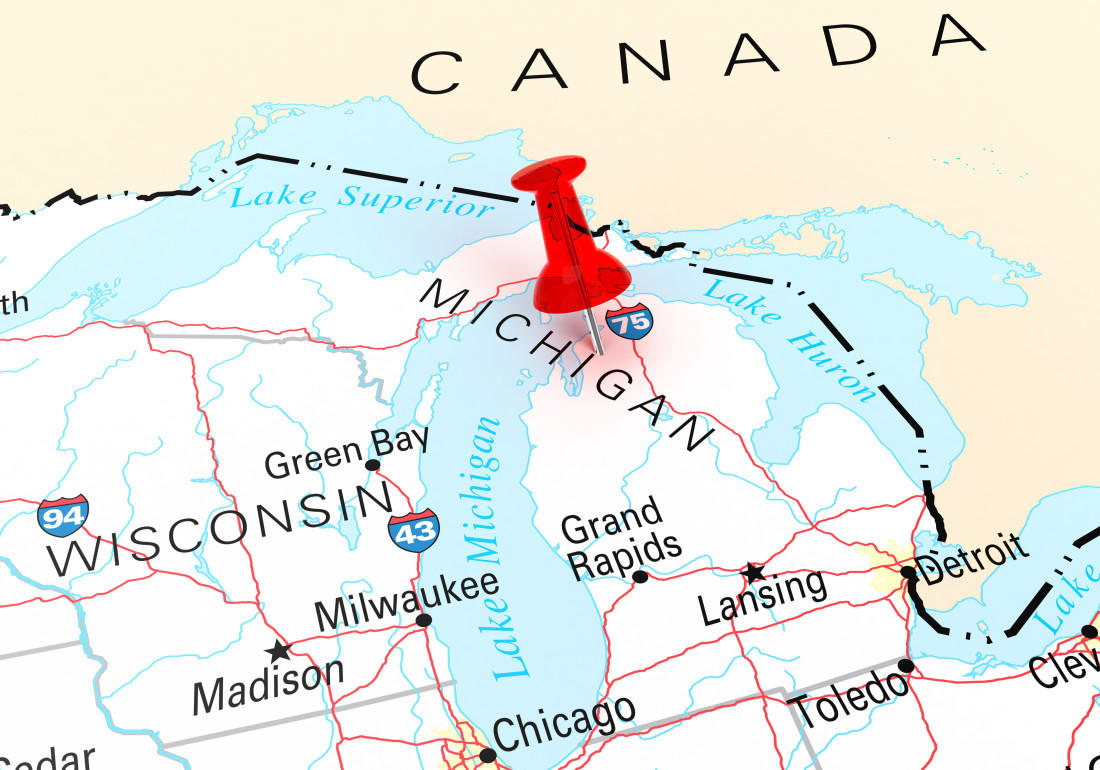The law takes effect March 31. UPDATE (3/29/19): According to the Detroit News, the law takes effect today -- March 29 -- absent action by the Attorney General to stop it.

On December 13, 2018, outgoing Governor Rick Snyder (R) signed into law the Michigan Paid Medical Leave Act. Here's the scoop:
Which employers are covered by the Act?
Employers of 50 or more employees, but not including the U.S. government, another state, or an agency of another state. A covered employer must provide paid medical leave to all of its eligible employees in the State of Michigan.
Who is eligible for paid medical leave?
Every employee in Michigan, with a lot of exceptions. Paid medical leave does not have to be provided to
- Employees who fall under the white-collar exemptions of the Fair Labor Standards Act.
- Employees covered by a collective bargaining agreement that is already in effect.
- Employees of the U.S. government, another state, or an agency of another state.
- Various transportation workers, including airline flight deck and cabin crews, and certain railroad employees.
- Employees whose primary work location is not Michigan.
- Employees who were employed 25 weeks or less in a job that was scheduled to last 25 weeks or less.
- "Variable hour" employees.
- Employees who averaged less than 25 hours a week in the calendar year that precedes the applicable "benefit year" (discussed below).
What are qualifying reasons for paid medical leave?
- The mental illness, physical illness, injury, health condition, or diagnosis, care or treatment of the same, or preventive care of the employee or the employee's "family member."
- Issues related to domestic violence or sexual assault (for example, counseling, getting legal assistance, or getting treatment for injuries) involving the employee or the employee's "family member."
- Closure of the employee's workplace or the school of the employee's child by a public official because of a public health emergency, or if the employee or the employee's "family member" is determined by a public official to put others at risk for communicable disease (even if the employee or family member doesn't actually have the disease).
Who is a qualifying "family member"?
- A biological, adopted, or foster child, stepchild, legal ward, or person for whom the employee stands in loco parentis.
- A biological, adopted, or foster parent, stepparent, or legal guardian or person who stood in loco parentis for the employee when the employee was a child.
- The employee's spouse.
- A grandparent or grandchild of the employee.
- A biological, adopted, or foster sibling of the employee.
That's all?
That's all. :-)
Is there any authorized "health care provider"?
The law adopts the definition of "health care provider" in the federal Family and Medical Leave Act.
How much leave do employees get?
Employees accrue 1 hour of paid leave for every 35 hours worked (but not for paid vacation, paid personal time, or PTO). The employer does not have to allow an employee to accrue more than 1 hour of paid leave per calendar week. The mandatory accrual is 40 hours of paid leave per benefit year. Employees must be allowed to use 40 hours per benefit year, and they must be allowed to carry over 40 hours of unused paid leave into a subsequent benefit year. Of course, the employer can be more generous than this if it so chooses.
If an employer provides its employees with at least 40 hours of paid leave per year, there is a rebuttable presumption that the employer is in compliance with the Act.
What's a "benefit year"?
Any 12-month period selected by the employer.
When will the accrual start?
Accrual will begin on the effective date of the Act (March 31), or upon commencement of employment, if later. The employer may require new hires to wait 90 calendar days before starting to use their accrued paid leave.
Is there a "front-loading" option?
Yes. If an employer wants, it can provide all 40 hours of leave to employees at the beginning of the benefit year, and can pro-rate that for employees hired mid-year. An employer who front-loads does not have to allow any carryover of accrued, unused leave.

How much (in dollars) does an employee get?
The dollar amount of paid leave is either (1) the normal hourly wage for the employee, or (2) the base wage for the employee, or (3) the minimum wage in Section 4 of the state Improved Workforce Opportunity Wage Act.
Employers do not have to take into account overtime, holiday pay, bonuses, commissions, supplemental pay, piece-rate pay, or gratuities in calculating the amount to be paid.
Is there a minimum increment of time that employers can require employees to use?
Yes. The minimum increment is one hour, but the employer can require paid leave to be used in a different increment if it has a written policy to that effect in an employee handbook or other employee benefits document.
What if an employee transfers to another location?
If the employee moves to another location working for the same employer, he or she keeps all leave that was already accrued at the time of transfer. The rest of what I'm going to say is my assumption and is not specifically addressed in the law: I assume that if an employee transfers out of Michigan, he would keep the leave that was accrued in Michigan but would not earn any more Michigan paid leave. If an employee transfers to a different location within the state of Michigan, I'd think she would keep her accrued leave and continue accruing more Michigan paid leave at the new location.
What if an employee has accrued unused leave when employment ends? Do we make a payout?
Not unless you want to! There is no requirement to pay out accrued, unused leave when employment ends -- whether it's a voluntary resignation, a retirement, or a termination.
Are there any notification requirements for employers?
Yes. The employer will have to post a notice stating the amount of leave to which employees are entitled, qualifying reasons for paid medical leave, and employees' rights in the event of a violation. The Michigan Department of Licensing and Regulation, which will enforce the Act, is going to create a poster. (I checked their website yesterday, and they don't have anything up yet.)
Are there any notification requirements for employees?
If you want them! The employer can require employees to comply with its usual notification and documentation requirements that apply to leaves of absence. If the employer requests documentation, it must give the employee at least three days to provide it. The statute specifically says that an employer may discipline or discharge an employee who doesn't comply.
In the case of paid leave taken for domestic violence or sexual assault, the employer must accept any one of the following as adequate documentation:
- A police report regarding the incident.
- A signed statement from the victim and a witness advocate saying that the victim is receiving services from a victim's rights organization.
- A court document related to the incident.
The employer is not allowed to request "details" of the domestic violence or sexual assault, and it must treat any information received as confidential.
What are the penalties for violations?
The employee has six months from the date of the violation to file a complaint with the Department of Licensing and Regulatory Affairs. The agency will investigate and try to get the matter resolved by mediation "or other means." If a violation is found, the employer will be required to pay the employee for any paid leave that was "improperly withheld" and is subject to a fine of up to $1,000. Failure to comply with the posting requirement will result in fines of up to $100 per violation.
That's it. The employee is not authorized to sue the employer.
How about records retention?
Records related to the employer's compliance with the Act must be retained for one year.
I've heard there was some political maneuvering related to this law. What's the word?
There was, indeed. A voter initiative on paid leave, which would have been much more generous for employees, was scheduled to be on the ballot in November 2018. The Republican-controlled legislature approved the proposed legislation in September, which took the matter off the ballot, and then moderated the terms significantly. Among other things, the referendum version would have provided 72 hours of annual paid leave instead of 40 and was not limited to employers with 50 or more employees. More on the politics is available here.
How did you come up with a March 31 effective date? I don't see that anywhere.
The legislation says it will take effect on the "91st day after final adjournment of 2018 Regular Session." According to Ballotpedia, the final adjournment was on December 31, 2018, and 91 days from that date is March 31, 2019. (Or maybe April 1, depending on how you count the days. April 1 is a Monday.) UPDATE (3/29/19): According to the Detroit News, the law takes effect today -- March 29 -- unless the Attorney General takes action to stop it.
- Of Counsel & Chief Legal Editor
Robin also conducts internal investigations and delivers training for HR professionals, managers, and employees on topics such as harassment prevention, disability accommodation, and leave management.
Robin is editor in chief ...
Also on Employment & Labor Insider
This is Constangy’s flagship law blog, founded in 2010 by Robin Shea, who is chief legal editor and a regular contributor. This nationally recognized blog also features posts from other Constangy attorneys in the areas of immigration, labor relations, and sports law, keeping HR professionals and employers informed about the latest legal trends.




































